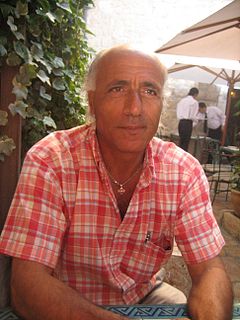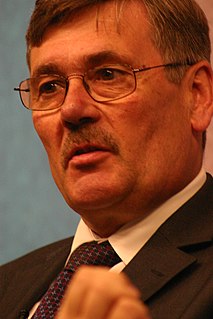A Quote by Paul Wolfowitz
One of the things that ultimately led me to leave mathematics and go into political science was thinking I could prevent nuclear war.
Related Quotes
Five million Jews are regarding me as a traitor, but six billion people around the world think me as a hero and a good man who bring the message to all the human beings that we should survive and prevent the use of nuclear weapons and to prevent the nuclear preparations and to prevent nuclear war in the future.
If you ask ... the man in the street ... the human significance of mathematics, the answer of the world will be, that mathematics has given mankind a metrical and computatory art essential to the effective conduct of daily life, that mathematics admits of countless applications in engineering and the natural sciences, and finally that mathematics is a most excellent instrumentality for giving mental discipline... [A mathematician will add] that mathematics is the exact science, the science of exact thought or of rigorous thinking.
Mathematics has two faces: it is the rigorous science of Euclid, but it is also something else. Mathematics presented in the Euclidean way appears as a systematic, deductive science; but mathematics in the making appears as an experimental, inductive science. Both aspects are as old as the science of mathematics itself.
What is the only provocation that could bring about the use of nuclear weapons? Nuclear weapons. What is the priority target for nuclear weapons? Nuclear weapons. What is the only established defense against nuclear weapons? Nuclear weapons. How do we prevent the use of nuclear weapons? By threatening to use nuclear weapons. And we can't get rid of nuclear weapons, because of nuclear weapons. The intransigence, it seems, is a function of the weapons themselves.
We have been led to believe that we have come a long way toward world nuclear disarmament. But that is not the case. Our government is not doing all that it could. We must urge our leaders to fulfill the obligations of the Nuclear Non-Proliferation Treaty. The United States must assume world leadership to end once and for all the threat of nuclear war. It is our moral responsibility.
I grew up feeling that to be gay was a tragedy. I didn't grow up thinking that it was morally wrong, but I grew up thinking that it would make me marginal, prevent me from having children, and quite possibly prevent me from having a meaningful long relationship. It seemed that this condition would leave me with a vastly reduced life.
Teller contended, not implausibly, that hydrogen bombs keep the peace, or at least prevent thermonuclear war, because the consequences of warfare between nuclear powers are now too dangerous. We haven't had a nuclear war yet, have we? But all such arguments assume that the nuclear-armed nations are and always will be, without exception, rational actors, and that bouts of anger and revenge and madness will never overtake their leaders (or military and secret police officers in charge of nuclear weapons). In the century of Hitler and Stalin, this seems ingenuous.
Science was blamed for all the horrors of World War I, just as it's blamed today for nuclear weapons and quite rightly. I mean World War I was a horrible war and it was mostly the fault of science, so that was in a way a very bad time for science, but on the other hand we were winning all these Nobel Prizes.
My activities, for which I gratefully accept this Award, are today what they have been for over thirty-five years and will be for the rest of my life: to counter governmental secrecy about the nuclear arms race that threatens the survival of life on earth; and to help build a world movement that will prevent a first use since Nagasaki of nuclear explosions, prevent or end interventions that could lead to such an event, and bring about a world free of nuclear weapons.



































